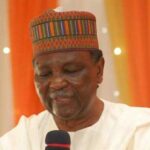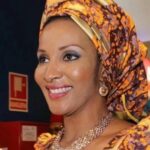It was the Jamaican Reggae musician Jimmy Cliff who sang in one of his evergreen hits that “You can’t be wrong and get it right, no matter how hard you may try…”. It is also not in doubt that he never had Nigeria’s wobbly dalliance with the politics of federalism in mind as he belched those words out. Yet those words of his, capture the wisdom in the courage of patriots like Professor Ango Abdullahi who are rising up to the occasion to set the country on the path of rectitude. To people in his mould, the country needs to beat a ‘U’ turn at this point in its journey to the promised land, if it hopes to arrive safely and on schedule, simply because the political realities dictate so.
In a recent interview with The Sun newspaper, the Professor noted that if Nigerians indeed want to stay together as one country, they should formally agree to do so, and if otherwise, so be it. He went further to aver that the North was not likely to be unduly handicapped in the event of Nigeria breaking up. Coming from a man of his accomplishments and social stature, it is not surprising that he drew a lot of flak for what some describe as “unguarded statement”. After all, it had been an open secret for either the right or wrong reasons that most Nigerians believe that the North is frigid over the prospects of Nigeria breaking up.
To accentuate his thesis is his background. Professor Ango Abdullahi, a frontline academic and former Vice Chancellor of the iconic Ahmadu Bello University (ABU) Zaria, astute politician and spokesman of the Arewa Consultative Forum (NCF) which is easily Nigeria’s most powerful pressure group, enjoys the authority to launch any thesis on the fortunes of the country, no matter how unpalatable it may be to some observers. He is a man who should know and is disposed to be taken seriously.
Although his sartorial social standing may on the surface render his take on the issue seemingly out of character, it does not in any way make him an advocate of Nigeria’s split. Rather he is only sounding realistically prophetic as future events may fit into his postulations. Hence, he does not qualify for any measure of excoriation for his views. Rather he represents the advocacy for a welcome revisionism whereby no outcome with respect to the country’s future, should be unthinkable, provided such a development is driven by a truly national consensus. The intrinsic beauty of his prognosis is the impetus it will deliver to a restart of the national conversation, in a direction of exploring fresh perspectives. And on such perspectives, will a new and viable Nigerian nation emerge if only they will dispense with the country’s age old fixation with moribund political circumstances,which aggravate the syndrome of arrested development in virtually all aspects of its economic and social life. Nigerians should be at liberty at all times to contemplate fresh ideas about what is best for the country.
It is significant that Abdullahi also noted the resurgence of regional political blocs that are designed to drive parochial economic development exclusively for their ethnic bases. In this respect are the Development Agenda for Western Nigeria (DAWN Initiative), for the Yoruba speaking areas of the country, and the campaign for Biafra under the aegis of the Independent People of Biafra (IPOB) and the Movement for Actualisation of Biafra (MASSOB), both in the Ibo speaking parts of the country. It is however worthy of note that these bodies also claim to have their inspirations from the fear of domination by the Northern oligarchy which his ACF represents.
It is also for the same reason of fear of privations in terms of denial of freedom of self- actualisation and other liberties in the Nigerian federation by the majority groups of Hausa/ Fulani, Yoruba and Ibo that the minority groups – in particular the Ijaws in the Niger Delta, are agitating. So, if Ango Abdullahi will with all the preponderant endowments of the North, as well as the fear in which it is held by the rest of the country as intimidating, talk of the readiness of the North to leave the Nigerian federation even if peacefully, what will those agitating for separation say? It is like saying that if the elite who lives in a well-appointed air conditioned apartment with burglary proof, mosquito net on the windows and a security guard in front of the door, claims to have been haunted and terrorised in the night by an evil spirit, what will the hunter sleeping bare-bodied under a tree in the thick forest claim to see?
Without doubt, there is enough cause to fear for Nigeria, especially in terms of the fact that there seems to be a sharp divide between the perceptions of the fortunes of the country by the old school era of Ango Abdullahi and the new school. While the old school may still be talking about the country as an assemblage of ethnic groups, the new school is bothered more with how to actualise themselves as viable economic actors in their country. As long as the claim to be a Hausa or Yoruba or even Ibo in the market place does not guarantee free access to food and other necessities of life, so long shall the chant of ethnic jingoism sound like an irritating, cracked music compact disc. Even the frenzied Ibo youth chanting solidarity songs in favour of the actualisation of Biafra is doing so in the hope that more economic opportunities will flow in the expected Eldorado of a separatist enclave.
Yet the elders of Ango Abdullahi’s era may not be helping matters as they are yet to direct the focus of the country’s leadership away from divisive ethnic tendencies and towards more useful directions such as are compatible with the development of an egalitarian society. The restructuring that Nigeria needs now is not along the line of power shift towards consolidating ethnic bases. Rather it is along lines of streamlining administrative functions to make the country work. That is all the present generation of Nigerians are demanding from leadership. And this demand is against the syndrome of seemingly irreversible stagnation in the public life of the country.
In the context of the foregoing therefore, rather than consider his message in the typical Nigerian tradition of ‘we and them’ template, and foreclosing whatever thinking that is at variance with the core concerns of the leadership community, it should rather serve as a wake-up call for the country to explore new grounds in social cohesion. Most Nigerians prefer to serve in heaven than rule in hell. Contemporary Nigerians are tired of a lot of tendencies that may have been topical in the past but are today seen as toxic. One of such is the clamour for the return to region based loyalties.
 Join Daily Trust WhatsApp Community For Quick Access To News and Happenings Around You.
Join Daily Trust WhatsApp Community For Quick Access To News and Happenings Around You.


